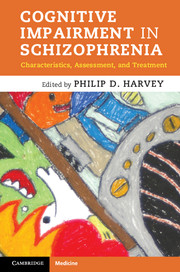Book contents
- Cognitive Impairment in Schizophrenia
- Cognitive Impairment in Schizophrenia
- Copyright page
- Contents
- Contributors
- Preface
- Abbreviations
- Section 1 Characteristics of cognitive impairment in schizophrenia
- Section 2 Functional implications and course
- Section 3 Genetic and biological contributions to cognitive impairment
- Chapter 10 Genetic influences on cognition in schizophrenia
- Chapter 11 Neurobiologicaldeterminants of cognition
- Chapter 12 Translational cognitive neuroscience of schizophrenia: bridging neurocognitive and computational approaches toward understanding cognitive deficits
- Section 4 Assessment and treatment of cognitive impairment and related features
- Index
Chapter 11 - Neurobiologicaldeterminants of cognition
from Section 3 - Genetic and biological contributions to cognitive impairment
Published online by Cambridge University Press: 05 February 2013
- Cognitive Impairment in Schizophrenia
- Cognitive Impairment in Schizophrenia
- Copyright page
- Contents
- Contributors
- Preface
- Abbreviations
- Section 1 Characteristics of cognitive impairment in schizophrenia
- Section 2 Functional implications and course
- Section 3 Genetic and biological contributions to cognitive impairment
- Chapter 10 Genetic influences on cognition in schizophrenia
- Chapter 11 Neurobiologicaldeterminants of cognition
- Chapter 12 Translational cognitive neuroscience of schizophrenia: bridging neurocognitive and computational approaches toward understanding cognitive deficits
- Section 4 Assessment and treatment of cognitive impairment and related features
- Index
Summary
Keywords
- Type
- Chapter
- Information
- Cognitive Impairment in SchizophreniaCharacteristics, Assessment and Treatment, pp. 176 - 192Publisher: Cambridge University PressPrint publication year: 2013



